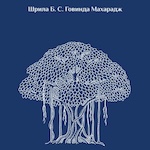«Шри Мадхвачарья»
Shrila Bhaktisiddhanta Saraswati Thakur
Shree Madhvacharyya
(Harmonist, No. 7, 1929)
THE point in the system of Shreeman Madhvacharyya that led Mahaprabhu Shree Krishna Chaitanya to prefer it to the other Vaishnava schools is that Shree Madhva holds that the individual soul is categorically and eternally distinct from Godhead. If there is anything which Shree Madhva*charyya disapproves with all the strength of his pure theistic nature it is the open and covert attempt to insinuate the equality and similarity of the jeeva with Krishna. The distinction between them is final and unbridgeable notwithstanding the fact that the jeeva is certainly part and parcel of Godhead in the sense that nothing can exist outside Godhead.
The logic of Shree Madhva is at once searching and decisive regarding the point at issue. If, he rightly contends, there is distinction and non-dis*tinction between any two entities the distinction is the real nature of their substantive relationship with one another.
According to Madhva the jeeva is a constituent part of Krishna. It is not admitted in this exact form by the Gaudiya School. The jeeva, according to the Gaudiya view, is a manifestation of an infinitesimally small particle of the Marginal Potency of Godhead. The nature of the jeeva is thus of the same kind as the Marginal Potency of Godhead. The jeeva is not akin to the Possessor of Potency, this distinction is not explicitly admitted by Shree Madhvacharyya. But it does not make the two systems differ vitally in actual practice.
Unless the distinction between jeeva and Godhead is admitted to be real and categorical the relationship of service stands on a very shaky basis, indeed. The position taken up by Shree Ramanuja is midway between these of Shankara, who is an exclusive monist, and Madhva who is a rigid dualist. Madhva thinks that Ramanuja endangers his logical position unnecessarily by what he regards as a concession to the Monistic view.
The jeeva is the eternal servant of Krishna. He is never the master except when he may be delegated authority for the purpose of service. The mastership of jeeva is no less service than any other more palpably recognizable serving function. The essence is the same always. If he is real*ized as power the point is clearly and absolutely defined.
The controversy is thereby shifted to the more intelligible ground of the nature of the relationship between Power and the Possessor of Power. Is Power to be considered identical with the Possessor of Power? The two should be distinguishable in practice. I possess the power of vision but I am not identical with the function of seeing. My nature as subject is no doubt expressed in the act of seeing. I can also make my existence effec*tive only through my activities. But I am always free to express myself in any way I like. I am not subject to the expression. It is my activity that is the derived category. The expression may stand separately on its own legs without interfering with my freedom to disown the same if I like. This logical subserviency of the expression to the will indicates the nature of the true relationship between them.
Logically speaking the Power of the Absolute is also necessarily Absolute. The Power of the Absolute should express only the Absolute. Are we, therefore, to admit two Absolute Entities? How also can the Absolute be the subservient to Himself? But the relative also cannot be subservient to the Absolute by the same logic. The relationship between the two is realizable as one of actual subserviency. The forms of the empirical logic cannot reconcile the apparent incompatibility. But the fact need not be disowned by undue deference to an admittedly faulty Science which is limited to certain cut and dry forms of procedure. The Power of the Absolute is Absolute in the sense that it is unlimited as regards its scope and form of operation. The Absolute Power is capable of operating in all conceivable and non-conceivable ways. That does not mean that it is not sub*servient to the Absolute Possessor of Power. One of the inconceivable ways in which the Absolute Power is found to operate is that it can pro*duce the manifestations of the Limiting Principle which are incompatible with its own subjective nature.
The jeeva is a product of Power. He is an eternal self-existing manifestation of Power. These are not contradictory when we bear in mind that the expression may exist independently arid eternally by the Will of the Possessor of Absolute Power. In this sense the Biblical dictum that ‘man is made after the image of God’, and not exactly as God, may be admitted with all necessary reservations to prevent any misconceptions of the na*ture to which exclusive Monists are found to be prone.
Shree Madhva did not analyze the relationship to the point of precision that it attained in the hands of the Gaudiya Acharyyas. But his sane theis*tic instinct unerringly fastened upon the supreme importance of emphasizing the absolute nature of the distinction between the jeeva and God*head as regards their respective natures and functions.
The jeeva is not only the product of Power, he is a spiritual agent who is detachable from subserviency to the Absolute Spiritual Potency eter*nally obeying Her Absolute Master. The jeeva is, therefore, in the position of the under servant whose proper function is to obey the Master un*der the guidance of the Plenary Spiritual Potency.
The jeeva is capable of being led astray if he does not allow himself to be guided by the Plenary Spiritual Potency. It is, however, legitimate and practicable to distinguish between the relationship of the jeeva to the Plenary Potency and that with the Possessor of the Potency. The plenary Potency is not the Master but the only Servant of the Master. The jeeva can never directly serve the Master. There is always one of two interven*ing Agents between the jeeva and Godhead. One of these Agents is called in the Scriptures the Plenary spiritual Potency to whom reference has al*ready been made. The other Agent is the Deluding Potency. This Latter gets hold of the jeeva who does not want to be guided by the Spiritual Po*tency but wants to be his own guide. Being himself of the nature of Potency it is not wholly unintelligible why he might desire to avoid the service of another whom he is to regard as his fellow-servant.
In other words the Plenary Potency is distinguishable from Godhead as the Obeying Principle in the Absolute. She is capable of being designated as the Counter Whole of the Absolute. That which carries out the Will of the Absolute is, therefore, the eternally associated Predominated Moiety of the Absolute Integer. It would be a grave error to regard the Plenary Spiritual Potency as an entity that is separable from the Absolute. The op*eration of the Plenary Potency is the only modus operendi of the Absolute.
The jeeva is placed in a lower grade of agents. The Plenary Potency may or may not allow him to serve Godhead. The Aspect of the Plenary Po*tency that is presented to the jeeva whom She wants to deprive of the service of Godhead is termed in the Scriptures ‘Maya’ or the Limiting Po*tency. The jeeva is provided by the Limiting Potency with limited faculties and functions in a corresponding world on the scale of his tiny magni*tude in order to allow him to indulge his disloyal attitude towards Herself. If the jeeva wants to serve Godhead according to his own judgment his inclination is nothing less than a form of unwillingness to serve at all. Because he must know very well that the guidance of the Plenary Potency is identical with that of Godhead Himself. It is, therefore, imperatively necessary to prevent any possible misconception of the difference that sepa*rates the jeeva from Godhead and His Proper Agent in Her Benign Undeluding Aspect. The jeeva is no servant of Godhead except by permission which has to be earned by a disposition of active loyalty in obeying unconditionally the Guidance of the Spiritual Potency.










































































































































